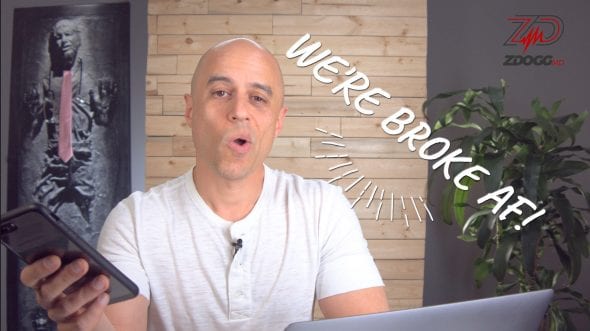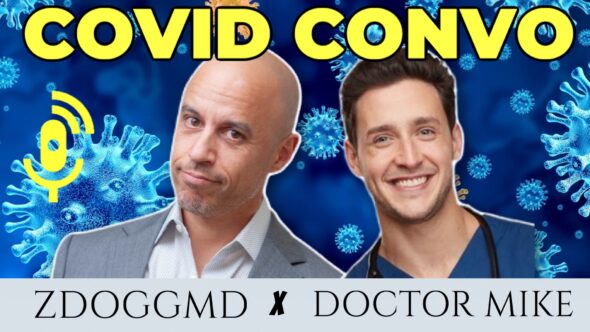Here’s how we can think about the new mRNA coronavirus vaccines in people with specific health conditions.
Some more resources:
- My explanation of how mRNA vaccines work
- Our interview with vaccine specialist Dr. Paul Offit
- My video about Guillain Barre syndrome and flu shots
- My video about the covid vaccine sterility hoax
- My discussion of the UK coronavirus mutation variant
Transcript Below!
COVID vaccination in pregnant women, lactating moms, people with autoimmune disease, immune dysfunction, Guillain-Barre syndrome, all these things, what’s the deal with that? Let’s talk about it right now. And this is a video you can share with anybody because I know these questions come up all the time because I get hundreds of them in my DMs. All right, the new mRNA COVID vaccinations are remarkably safe and effective judging by the tens of thousands of people that were in the trials and the 2 million people, mostly healthcare professionals so far and some cheaters who are cutting in line, I’m looking at you, politicians and administrators. In the 2 million people that have gotten it so far, really, the main thing that we’ve seen has been a handful of anaphylactic allergic reactions.
And that’s one thing we should come out of the bat and say if you have a history of severe allergic reactions to any of the components in these vaccines and the list of ingredients is available online. But basically what we think so far is that it might be the polyethylene glycol, which is one of the compounds in the vaccination that helps with the adjuvant immune response or part of the nanoparticle around these mRNA vaccinations, those people should absolutely not get it. But for everybody else, it’s more complicated. So let’s talk about that. And by the way, there’s been a handful of those immune reactions, right?
Those anaphylactic allergic reactions, and all of them have occurred within the, you know, 15 to 30-minute monitoring period where you’re watching people and they’ve all been reversed with medical intervention. So this is a treatable thing. But, again, if you know you have this reaction to a vaccine, you probably shouldn’t get this. All right, that being said, pregnant women and lactating, so breastfeeding mothers, why do we even make a distinction here? Well, pregnancy is a totally different game. And when we look at other vaccinations, if you look at live attenuated vaccines, these are vaccines that take the virus in question or the bacteria, whatever it is that you’re vaccinating against, and they weaken it, but it’s still a living virus. And that can produce an immune response that then teaches your body to fight it off when the real virus comes, the virus that can actually replicate really aggressively and cause disease, the virus in the vaccines is weakened, right? But there’s a theoretical risk that it could replicate and cause disease. You know, for example, varicella, chicken pox vaccination right? Theoretically, it’s a live vaccine.
MMR has live components in it, measles, mumps, rubella. And so we say in pregnancy, don’t get those vaccinations. And the reason is, again, it’s this theoretical risk that if you get infected with the virus in the vaccine, which again is it’s theoretical, that’s potentially dangerous in pregnancy. So why take that risk during pregnancy? Okay, that’s fine. I think that makes sense. You wanna be very careful as you can. So what’s the deal with the mRNA vaccines that are used in the COVID vaccination? And the answer is I’m gonna pull up your comments here as well and make sure that we’re streaming correctly live. The mRNA vaccine does not contain live virus. In fact, it doesn’t even contain killed attenuated virus. It doesn’t even contain viral fragments.
What it contains is the genetic message mRNA wrapped in a lipid nanoparticle. And I did a video on this, I suggest you watch it. That piece of genetic information enters the cell and tells the cell to produce the spike protein, the protein on the surface of the coronavirus that you want to produce an immune response to because that will prevent the virus from entering cells and infecting you, right? So in that sense, there’s no chance this thing is gonna produce living virus. There’s no chance it’s gonna produce something that’s gonna infect you and make you sick. And if there’s no chance that the messenger RNA is gonna enter the nucleus of the cell and interact with your genetic code, your DNA and insert itself, ’cause I know that’s been going around online.
It doesn’t happen. That’s not how Messenger RNA works. In fact, Messenger RNA needs to be protected in this lipid nanoparticle, because normally it’s broken down so fast by cells. So it’s a short-lived thing. You produce the protein. And in pregnant mothers, this should produce an immune response, antibody response that protects the mother but also antibodies, the business end of our immune system that you’re training with the vaccines, can cross the placenta. Oh my God, it crosses the placenta, is it gonna hurt my baby? And the answer is no, it’s gonna protect your child. And in the first six months in particular after birth, it’s those maternal antibodies that cross the placenta like a shield, they protect the baby. So there’s a lot of theoretical upside to vaccinating pregnant mothers because getting COVID during pregnancy is associated with worse outcomes, preterm birth.
And also if you get really sick in pregnancy from COVID, and again, the absolute risk isn’t that high because usually pregnant women are younger, but if they have other medical conditions, if they’re unlucky, if they have bad genetics, we don’t know really why some people get very, very sick from coronavirus, that’s gonna affect them worse than somebody who’s not pregnant based on observational studies that have been done. And so the question then for a pregnant mother is risk and benefit. Okay, what are the risks of the vaccine? Well, there’s really none that we’ve seen so far even theoretical and they’ll say, oh, what about this thing where it attacks the placenta? I saw that on Facebook. We did a video on that. That’s total BS. It doesn’t happen, okay? That’s just anti-vaccine propaganda. Now, you should be concerned about things like that in general, because you worry in pregnant mothers.
Because the main problem with this is it hasn’t been studied directly in pregnant women. In other words, pregnant women were excluded from the randomized trials that got the Moderna and the Pfizer vaccine approved. So even though we now have 2 million people out there who’ve gotten the vaccine and some people have gotten pregnant while being vaccinated, et cetera, we don’t have a robust enough data set yet to say, oh, it’s been looked at specifically. Now those studies are ongoing, but it’s been looked at specifically in pregnancy and we can say that it’s safe and effective in pregnant women. We don’t have that data, which means this, and the American College of Obstetricians and Gynecologists, the Society of Maternal Fetal Medicine have both weighed in as it has the CDC and said, there’s no reason that they shouldn’t get it, theoretically, right? We don’t have great safety data.
So this is a conversation to be had with your doctor and with the mother. It’s a risk-benefit analysis. Now I’ve given you the information that we do have. Now you can make the educated decision and say, okay, this is something I want during pregnancy. Now, again, you may not get it right now ’cause you may not be in line. But if you’re a healthcare professional, you’re one of the frontliners that is due to get this vaccination, you’re gonna have to make this decision. And now you have the information to have the conversation with your healthcare professional and make the decision. Now what about lactating mothers, mothers who are breastfeeding? This one’s a little easier. Now, again, it hasn’t been studied specifically in lactating mothers.
So we don’t have that dataset. Now, that always makes us a little uncomfortable, right? Because we can’t say anything firmly, but we can say, okay, well, theoretically, since there’s no live virus, there’s nothing to infect you through the breast milk, there is no reason that you cannot have this vaccination while you’re breastfeeding and lactating, period. And if anything, if you’re producing antibodies and some of those cross into breast milk, you’re protecting your child with these antibodies. Now again, children are pretty low risk for getting very sick from COVID. So I wouldn’t get vaccinated just to protect your child, but you have to do your own risk-benefit and say, okay, it hasn’t been studied specifically, but theoretical risks are negligible with breastfeeding mothers. And I think that’s reasonable to say, and CDC and others have said the same thing. So now you have pregnant women, breastfeeding mothers, lactating moms. What about, and I get this question a lot, what about, and I’m just peeking to make sure your comments are still coming. Yup, Marilyn Garner’s here, who’s a supporter says, so many issues with moms that get COVID, calcification of the placenta, postpartum hemorrhage, abnormal visual exam of the placenta, fetal distress, preterm delivery, death of the mother and fetus.
So I think you kind of summed up why the American College of Obstetricians and Gynecologists and the Society for Maternal-Fetal Medicine have said, you know what, on balance, we think you should get those. Because getting COVID during pregnancy is not good. So, again, it’s risk and benefit, risk and benefit. What’s the risk? We don’t have specific data for this vaccine in pregnant mothers. Now, now one important thing to remember: if you’re pregnant and you get the vaccine and you have a fever, they do recommend, and this is different than the general public. I’m gonna do a separate show on fevers during vaccination. Should you treat it with Tylenol or Advil or Motrin? Well, first of all, in pregnancy shouldn’t really be using depending on the stage of pregnancy, but you shouldn’t be using Motrin and Advil and these non-steroidal anti-inflammatories. But they recommend Tylenol for fever in pregnancy because fevers during pregnancy have been associated with worse pregnancy outcomes. Now let me repeat what I just said, associated with. We don’t know that fever causes pregnancy bad outcomes, but more likely if you have a fever, you have something else going on and your likelihood of having a complicated pregnancy is higher. So, but what they say is to be safe, go ahead and give Tylenol, acetaminophen if you have a fever after the vaccination during pregnancy. But talk to your doctor about this, all right?
So that’s pregnancy, lactating mothers. Autoimmune disease, billion people have asked me about this. I have rheumatoid arthritis. I have lupus. I have Sjogren’s disease. I have Behçet’s disease, diseases where the body is mounting an immune response to itself. There are auto antibodies, antibodies against human tissue. Could it be that this vaccine will make those worse by firing up the immune response in general? we’ve seen that it does that because you get these fevers and muscle aches and weakness and headaches and joint pain. And, oh my gosh, is that an autoimmune response? Well, the feeling with that is that’s an immune response that you would get to any foreign invader, infection, et cetera. And it’s actually a sign that your immune system is appropriately jazzed up and is learning through memory cells how to mount a response to COVID, coronavirus when it comes. So the authorities and the CDC and others have said, this is something where, again, we haven’t specifically studied it in autoimmune disease, but there isn’t a good theoretical reason even with mRNA vaccines, knowing how they work, that you shouldn’t get the vaccination if you have autoimmune disease, that it’s gonna make autoimmune disease worse. We have not seen any evidence of that.
And on top of that, if you have autoimmune disease, the likelihood of getting more sick, if you’re naturally infected with coronavirus, is higher. And so, because you’re taking immune suppressing drugs, you’re doing all kinds of stuff, it’s vastly better, probably, on a risk-benefit to get the vaccination than to get COVID even though we don’t have the data set yet in your population with that vaccine, although I think that will emerge as we vaccinate millions of people. So that’s the thinking with autoimmune. Now, again, this is a personal risk-benefit decision. I’m not gonna sit here and tell you, go get vaccinated. I’m gonna say, well, these are the risks. This is the benefit. This is what we know, this is what we don’t know. Now you can talk to your doctor and whoever is helping you make decisions and make the decision rationally instead of based on some crap you saw on Facebook that isn’t, he isn’t a doctor, isn’t someone who has any scientific training or worse they have an agenda that has to do with anti-vaccine sort of propaganda. And listen, I said early on, just so you understand that there was no way I was even gonna accept that this vaccine is gonna work without seeing the dataset. It’s not a carte blanche for this. That’s not how science works.
You look at the data, you ask the questions, you see what you have, and you do a risk-benefit and you make a decision, right? And for me, the risk-benefit is, yeah, get the vaccine. It’s really not even a question. It’s not even close for me, right? Now if you have autoimmune disease, pregnant, that kind of thing, you have to make that decision based on the idea that we don’t have data in your population. Okay, now the other population associated with this, excuse me, I have COVID, probably GERD actually, is people with immune dysfunction. So compromised immune systems. So maybe you’re taking medications that suppress your immune system. Maybe you’re living with HIV. And there were patients living with HIV in the trials for these according to CDC and the, again, the sentiment as well, you’re at good, a good deal risk from being very ill from actual coronavirus infection. And there’s no reason to believe that this vaccine, the mRNA vaccine, which does not contain live attenuated virus that can replicate in your immune compromised body, there’s no reason to believe that, so you should get them vaccine.
And in fact, if anything, you may not have as robust response to the vaccine because your immune system is compromised. So all the more reason to give it a shot, because at that point, at least you’re getting potentially some protection versus none and leaving yourself vulnerable to a virus that we’ve shown is not good in your population to get, okay? So I think that’s an important piece. Now, one little side note on this, you know that mutation variant in the UK that’s now spreading so rapidly, and I did another show on this that you should watch, it seems to be a little more spreadable though we’re not 100% sure about that because there’s complications. You should watch that video. There’s some feeling that the reason that mutant, that variant occurred with the multiple mutations in it is that there was a patient who had an immune compromised situation. In other words, maybe they were a cancer patient. Maybe they were on immune suppressants, maybe they had a genetic issue, where they couldn’t have a normal immune response. So the virus, so this two phase, the virus can replicate in them rapidly and dramatically.
But since they don’t have an overwhelming immune response, they don’t get all that cytokine storm and immune system that goes haywire that attacks themselves, so they don’t get super, super, super sick. So they may have a chronic infection where the virus is just replicating and doctors are throwing everything at it. Convalescent plasma that contains antibodies. So they’re actually giving foreign antibodies that have been made by other people to this patient to try to decrease the viral replication and fight the virus by proxy since their own immune system can’t do it. So what ends up happening theoretically is the virus keeps replicating. You give antibodies and then you start killing all the virus that’s susceptible to the antibodies, but it’s still replicating. So the virus that isn’t, that happens to have those mutations that happen naturally, that occur naturally gets selected for evolutionarily in that one person. And now you end up with a population of that virus that’s enriched in the variant that has all these mutations that maybe are a little less susceptible to those antibodies, maybe a little bit, maybe a little more infectious, and then that thing spread.
So that’s theoretically one of their proposals for how this happens. So isn’t that interesting? Again, all the more reason to vaccinate, because if you have any immune response at all to that vaccine, it’s gonna be better than nothing. All right, the other group in this that’s related to this is people who have had Guillain-Barre syndrome. Now, Guillain-Barre is a kind of scary thing that can happen. It’s often reversible, but it’s very scary. And I’ve taken care of these patients, and it is an ordeal because you can end up in the ICU on a ventilator. What happens is you mount an immune response to your own sort of nervous tissue and end up, the term is demyelinating it. Kind of stripping the insulation off your nerves and it causes an ascending paralysis. So it starts with the feet and then it moves upwards and eventually can affect your muscles of respiration, in which case you need to be on a ventilator. So it’s a big deal, Guillain-Barre. And the treatment is kind of supportive care and you’re in the ICU and all of this. And it is associated with certain vaccinations. But to clarify, so for example, influenza vaccination in very, very rare instances can be associated with Guillain-Barre. But getting infected with flu in the real world is a much higher risk of Guillain-Barre. So the idea is there’s some immune response to the virus that goes haywire potentially and causes this sort of stripping of the nerves, right? It’s very rare.
Now it turns out with these new mRNA vaccines we have yet to see a case of Guillain-Barre, knock on wood. It doesn’t mean it won’t happen. And it happens in the background population anyways. So what the recommendation is is if you have a history of Guillain-Barre syndrome, you can still get the coronavirus vaccine. But, again, it’s not like we had a hundred Guillain-Barre patients and we’re able to study it in that population and say for sure. So you, again, have to do the risk-benefit analysis. A 20-year-old who had a history of Guillain-Barre, who’s very low risk for getting sick or dying from COVID, you may say, well, I don’t think I’m gonna get this vaccination just yet. I’m gonna wait for more data. Whereas a 70-year-old with congestive heart failure, diabetes, who’s had a history of Guillain-Barre and a pulmonary disease, where if they got infected with COVID, they would die, maybe it makes sense at that point that risk-benefit is pretty clear. So that’s kind of how you would think about that. So we talked about Guillain-Barre.
We talked about immune dysfunction, autoimmune disease, pregnancy, lactating moms, people with HIV. Again, the general consensus is go ahead and do this. Now, again, unless you have a severe immune reaction to a component of the vaccination itself. Now, the question of what if you had COVID recently, we’ll try to address in another show, but the bottom line is nobody really knows how long the natural COVID immunity lasts for. Some people will say, well, within three months the chances are of you getting it again are very low, so you don’t have to rush and get the vaccination. But getting it if you’ve had recent coronavirus infection does not seem to be a problem. One of the things they say is if you’ve had any monoclonal antibodies to, while treated for coronavirus, you probably shouldn’t get the vaccination for at least three months is what they’re saying. And again, these things may change as we get more data, but that’s what we understand now.
So this is what I will say. Share this video with people who’ve been asking you these questions. We need to drown out misinformation with rational scientific talk. If you like what we do, become a supporter of the show on Facebook, YouTube, or Locals and you get deeper conversations with me that are a lot of fun. We have all kinds of stuff. Go to zdoggmd.com/supporters and you can see all the options there. It pays for all this so that we’re no one’s pocket but yours. All right, guys, I love you, stay well. And we are out, peace.
Category
- The ZDoggMD Show (818)
- Featured Videos (189)
- Doc Vader (142)
- Against Medical Advice (128)
- Medical Humor (95)
- Public Service Announcements (87)
- Music Parodies (74)
- Nurses (59)
- Meditation (46)
- The VPZD Show (38)
- ZVlogg (36)
- ZTalks (28)
- ZBlogg (24)








